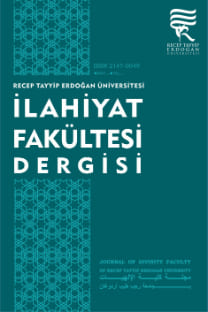AMELİ SORUMLULUKTA NESNEL ÖLÇÜTLER
İstitâat, sorumluluk, istitâati müyessire, istitâati mümekkine
Istitaat (Capability) in Term of Impact Operational Responsibility
İstitâ‘ah (capability), responsibility, capability in muyassarah (facili-tator) and capability in mumakkinah (standard),
___
- ABDÜLBÂKÎ, Muhammed Fuad, el-Mu‘cemü’l-mufehres li-elfâzi’l-Kur’ani’l-Kerim, el-Mektebetü’l-İslâmiyye, İstanbul, 1982. AHMED b. HANBEL, Ahmed Muhammed b. Hanbel (241/855), Müsned, I-VI, 2. Baskı, Çağrı Yayınları-Dârı Sahnûn, İstanbul, 1992. ALİ HAYDAR (1334/1915), Dürerü’l-hükkâm şerhü Mecelleti’l-ahkâm, Arapça’ya trc. Fehmi el-Hüseynî, Dâru’l-Kütübi’l-‘İlmiyye, Beyrut, ts. ÂMİDÎ, Seyfeddin Ebu’l-Hasan Ali b. Muhammed (631/1233), el-İhkâm fî usûli’l-ahkâm, thk. İbrahim el-‘Acûz, I-IV, Dâru’l-Kütibi’l-İlmiyye, Beyrut, ts. ATAR, Fahrettin, Fıkıh Usûlü, 3. Baskı, İFAV Yayınları Nr. 24, İstanbul, 1996. BİLMEN, Ömer Nasuhi (1391/1971), Hukuki İslâmiyye ve Istılâhatı Fıkhıyye Kamusu, I-VIII, Bilmen Yayınları, İstanbul, 1967. BUHÂRÎ, Abdülaziz b. Ahmed (730/1330), Keşfu’l-esrâr ‘an Usûli Fahru’l-İslâm el-Pezdevî, thk. Muhammed el-Mu‘tesîm Billâh el-Bağdâdî, I-IV, 2. Baskı, Dâru’l-Kitâbi’l-‘Arabiyye, Beyrut, 1994. BUHÂRÎ, Ebû Abdullah Muhammed b. İsmail (256/869), el-Cami‘u’s-sahîh, I-VIII, 2. Baskı, Çağrı Yayınları-Dârı Sahnûn, İstanbul, 1992. BUHÛTÎ, Mansûr b. Yunus (1052/1641), Keşşâfü’l-kınâ‘ ‘an metni’l-iknâ‘, thk. Ebû Abdullah Muhammed Hasan İsmail, I-VI, 1. Baskı, Dâru’l-Kütübi’l-‘İlmiyye, Beyrut, 1997. CEZÎRÎ, Abdurrahman b. Muhammed ‘İvad (1360/1941), Kitâbu’l-fıkh ‘ale’l-mezâhibi’l-erba‘a, 1. Baskı, Dâru’l-Fikr, Beyrut, 1999. CÜRCÂNÎ, es-Seyyid eş-Şerîf Ali b. Muhammed (816-1413), Kitâbü’t-ta‘rîfât, thk. Abdülmün’im el-Hefenî, Dâru’r-Reşâd, Kahire, ts.
- Yayın Aralığı: 2
- Yayıncı: Recep Tayyip Erdoğan Üniversitesi İlahiyat Fakültesi
AMELİ SORUMLULUKTA NESNEL ÖLÇÜTLER
KUR’AN-I KERİM TEFSİRİNDE BİLİNMESİ GEREKENLER ÜZERİNE
J. Stanley MOORE, Emine BATTAL
DİN KÜLTÜRÜ VE AHLAK BİLGİSİ DERSİNDE ELEŞTİREL DÜŞÜNME ÖĞRETİMİ
ŞEYH EBU’L-HASAN-I HARAKĀNÎ’YE GÖRE CİVÂNMERTLERİN TÖRESİ VE CİVÂNMERTLİĞİN USÛLÜ
Rahman MOSTAGH MEHR, Abdurrahman ACER
EHL-İ HADİS VE SELEFÎ DÜŞÜNCEDE EZELÎ YAZGI, KADER VE ECEL ANLAYIŞI
et-Tahkîk fî kelimâti’l-Kur’âni’l-Kerîm
SESBİLİMİN KURUCUSU EL-HALİL B. AHMED
Ahmed Muhammed Sâlim EZ-ZÜVEY, Necattin HANAY
